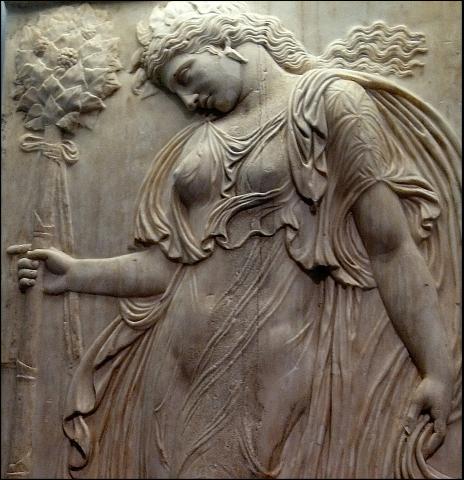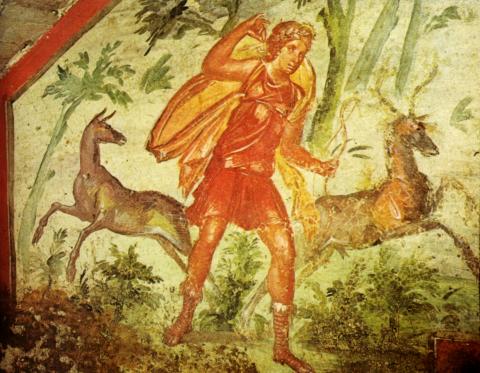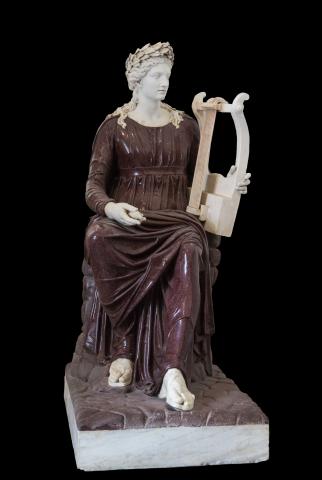Hercules. Thēseus tacitus. Amphitryōn. Megara. Chorus.
HER. Ultrīce dextrā fūsus adversō Lycus895
terram cecīdit ōre; tum quisquis comes
fuerat tyrannī iacuit et poenae comes.
nunc sacra patrī victor et superīs feram,
caesīsque meritās victimīs ārās colam.
Tē tē labōrum socia et adiūtrīx precor,900
belligera Pallas, cuius in laevā ciet
aegis ferōcēs ōre saxificō minās;
adsit Lycūrgī domitor et Rubrī Maris,
tēctam virentī cuspidem thyrsō gerēns,
geminumque nūmen Phoebus et Phoebī soror905
(soror sagittīs aptior, Phoebus lyrae),
frāterque quisquis incolit caelum meus
nōn ex novercā frāter.
Hūc appellite
gregēs opīmōs; quidquid Indī arvīs secant
Arabēsque odōrīs quidquid arboribus legunt910
cōnferte in ārās, pinguis exundet vapor.
pōpulea nostrās arbor exōrnet comās,
tē rāmus oleae fronde gentīlī tegat,
Thēseu; Tonantem nostra adōrābit manus,
tū conditōrēs urbis et silvestria915
trucis antra Zēthī, nōbilis Dircēn aquae
laremque rēgis advenae Tyrium colēs.
— date tūra flammīs.
Notes
Hercules opens Act 4 with a proclamation of his defeat of Lycus. The confrontation happens in an unspecified span of time between Acts 3 and 4, setting the scene in the moments after Hercules’ victory. In his triumph, he prepares for his sacrifice to the gods, calling for sacrificial victims, incense from India and Arabia, and garlands to be brought forward. Hercules will sacrifice to his father Jupiter, and asks Theseus to honor the founders of Thebes.
Act 4 Essay
Hercules returns from killing Lycus and begins to perform a sacrifice to the gods. Amphitryon reminds him to clean his hands first, as they are still dripping with Lycus’ blood. As Hercules prays for peace throughout the world, he begins to experience an episode of madness induced by the Furies as Juno threatened in the opening monologue. Hercules first sees an eclipse of the sun, and then hears the gods calling him to overthrow Jupiter and conquer Olympus. His delusion then turns more sinister: he believes the Fury (Erinys) is attacking him, and that his own children are Lycus’ children.
read full essay
Hercules then runs offstage, and Amphitryon narrates how he storms into the palace to murder both the children and his wife Megara. Hercules returns to the stage, says that he has offered the victims as sacrifices to Juno, and then collapses.
Juno’s threat from Act 1 to turn Hercules against his family has now been fulfilled. In Euripides’ play Herakles Mainomenos (“Hercules Gone Mad”), written in the 5th century BCE, we see the goddess Lyssa (Madness) actually interacting with Heracles and driving him mad. In Seneca’s version, we only see Hercules abruptly switch moods from triumphant to insane. This difference led some earlier critics to propose an internal motivation for his actions. Some argued that Hercules secretly hated his family—which is quite implausible, since he has just returned to rescue them from Lycus. A more plausible interpretation is that Hercules is like a contemporary sufferer of PTSD. He has poor impulse control, has lost control of his reactions, and blacks out after an episode of mania. The latter interpretation gets at part of the truth: Hercules is a violent man who has committed many murders during his career, and there is certainly an overlap between this ancient story and our modern conception of PTSD. But we cannot discount the importance of external motivation and ignore the role of the Fury, else the entire first Act and its dialogue with Augustan epic would appear superfluous.
We do not see Hercules murder his family, thanks a convention of ancient stagecraft which precluded showing violence onstage. Instead, Amphitryon narrates Hercules’ actions as they happen. This dramatic technique recalls the ancient pantomime, a popular stage form in the Roman empire. These were spectacles featuring solo dancers performing favorite scenes from mythology. The story of mad Hercules was a very popular pantomime subject. Macrobius, a Roman scholar of the 5th century CE, preserves an anecdote regarding a performance of Hercules by the Augustan-era actor Pylades of Cilicia, one of the founders of the genre of tragic pantomime:
"When he had come on to dance The Madness of Hercules, some of the spectators thought that he was not keeping to action suited to the stage. Whereupon he took off his mask and rebuked those laughing at him with the words: “Fools, my dancing is intended to represent a madman.” It was in this play too that he shot arrows at the spectators." (Macrobius Saturnalia 2.7.16–17, trans Kaster)
Seneca worked in a neighboring genre where shooting arrows at spectators was not a possibility. Amphitryon’s reactions instead enable the audience to visualize the action taking place offstage, and the effect is no less suspenseful for not being visible.
895–96 ultrīce dextrā: ablative of means (AG 409). Hercules sought vengeance for the injuries Lycus inflicted on Thebes and his family in his absence. fūsus: “cast to the ground, vanquished, prostrated” (LS fundo I.B.2.b.β), predicative adjective describing Lycus. adversō … ōre: “with face downward” (Fitch 2018): ablative of manner (AG 412). terram cecīdit: “fell to the ground,” accusative of place to which, used more freely in poetry than prose (AG 428.g).
896–897 comes … comes: ending both lines with comes emphasizes how Hercules’ anger goes beyond Lycus to his “companions.” Comes foreshadows how this anger will later fuel Hercules’ eventual assault on his own children, whom he confuses as the children of Lycus in his madness. et poenae comes: “also a companion of his punishment”; as often, et = etiam. Whoever accompanied Lycus in his tyranny has accompanied him to his death.
898 sacra: “sacred gifts,” “offerings” (LS sacrum I.A.β). patrī: Hercules’ father Jupiter. victor: “as a victor.”
899 meritās … ārās: the gods deserve thanks, so their altars are “deserving” by extension. caesīs … victimīs: ablative of means (AG 408). The language conflates Hercules’ victims (Lycus and his comitēs) with the usual animal sacrifice. Note the careful word order of this line: two adjectives, followed by two nouns, concluding with the verb.
900–908: Hercules invokes a series of gods to whom he offers sacrifice: Minerva, Bacchus, Apollo, and Diana. They are his half-siblings by Jupiter and women other than Juno. He concludes with a general invocation of “any brother of mine who lives in heaven” (frāterque quisquis incolit caelum meus) and specifies “[but] not a brother born of my stepmother” (nōn ex novercā frāter), since any sons of Juno might be hostile to him out of loyalty to their mother.
900–901 tē tē: Minerva. The repetition is characteristic of prayer style. socia et adiūtrix: vocatives. Hercules describes Pallas as his helper because she assisted him during his Labors. Pallas: = Minerva.
901–902 cuius … aegis: Ovid’s Metamorphoses (4.753–803) and other sources tell the story of how, after Perseus killed Medusa, Minerva placed the head on her shield, where it became the aegis. ōre saxificō: “a petrifying expression,” ablative of means (AG 408). The Gorgon Medusa could turn people to stone with her glare.
903 adsit: jussive subjunctive (AG 439). Lycūrgī domitor et Rubrī Maris: Lycurgus of Thrace banned the cult of Dionysus (Bacchus). Bacchus punished him by driving him mad and causing him, like Hercules, to kill his wife and son. Bacchus also traveled to India, and so could be loosely called the “conqueror of the Red Sea.”
904 tēctam: modifies cuspidem and governs virentī … thyrsō: “covered in a verdant thyrsus.” A thyrsus is a staff or spear tipped with a cone or vines, carried by Bacchus or his followers. A Roman relief from the Prado Museum depicts a Maenad carrying a thyrsus.
905–906: the repetition of key words in these lines is again characteristic of prayer style. Understand adsit from 903. Phoebus et Phoebī soror: Apollo, god of music, and his sister Diana, goddess of the hunt. sagittīs aptior… lyrae: Diana typically holds a bow and Apollo a lyre, as these images from the Roman imperial era indicate.
908 appellite: imperative, presumably addressed to some slaves standing nearby, like date in 918.
909 gregēs opīmos: sacrificers offered the gods their best animal victims. arvīs: ablative of place where (AG 429.4).
910 odōrīs … arboribus: ablative of source (AG 403), “from fragrant trees”
911 pinguis exundet vapor: jussive subjunctive (AG 439), “let thick smoke billow up.”
912 exōrnet: jussive subjunctive (AG 439). pōpulea … arbor: Hercules follows the Chorus’s instruction to cover his hair with poplar leaves (893–94 comās… tege populō). Both here and in the following line, Seneca uses a combination of adjective and a noun in place of simple nouns (populus, olea). These uses of periphrasis create a more elevated style.
913 tegat: jussive subjunctive (AG 439). fronde gentīlī: ablative of means (AG 408): “with your people’s foliage.” Theseus was king of Athens, famous for its olive trees.
914 Tonantem: see line 1.
916 trucis … Zēthī: Zethus built the walls of Thebes with his brother Amphion. He is probably described as trux (“fierce”) to distinguish him from his brother. Amphion was a musician, while Zethus “took to the rough herdman’s life” (Fitch 1987); see Apollodorus 3.5. nōbilis ... aquae: genitive of description. Dircēn: a famous river of Thebes, accusative in a Greek declension (AG 44).
917 laremque rēgis advenae Tyrium: Seneca places the final object in his list in a carefully structured order in chiasmus according to case (acc. – gen. – gen. – acc.). Cadmus, founder of Thebes, came from the ancient city of Tyre in Phoenicia, now in Lebanon.
Vocabulary
ultrīx –īcis: avenging; avenger
tyrannus tyrannī m.: tyrant
meritus merita meritum: deserved, worthy
victima –ae f.: sacrificial animal; victim
socia –ae f.: a partner
adiūtrīx –īcis f.: a female assistant
belliger –era –erum: warlike, waging war
Pallas –adis f.: Pallas Athena
laeva –ae f. (sc. manus): the left hand
cieō –ēre –cīvī –citus: to move, rouse; excite; invoke
aegis –idis f.: the shield of Jupiter
ferōx ferōcis: bold; wild
saxificus, –a, –um: that turns into stone, petrifying
minae –ārum f. pl.: battlements, threats
domitor –ōris m.: tamer, conquerer
ruber rubra rubrum: red
vireō virēre viruī: to be green
cuspis –idis f.: sharp point, tip; spear
thyrsus –ī m.: the stalk of a plant; a staff wreathed with ivy and vine-leaves
geminus –a –um: twin
Phoebus –ī m.: Phoebus Apollo
sagitta sagittae f.: arrow
lyra –ae f.: lyre
incolō incolere incoluī: to cultivate; dwell, inhabit
noverca novercae f.: stepmother
appellō –ere –pulī –pulsus: to drive, move toward
grex gregis m.: herd, flock
Indus –ī m.: an Indian
secō secāre secuī sectum: to cut
Arabs –abis m.: an Arabian
odōrus –a –um: emitting a smell, sweet or ill scented
pinguis pingue: fat, rich; dull, quiet
exundo -avi: to overflow; pour forth
vapor –ōris m.: vapor, steam; heat
pōpuleus –a –um: of the poplar tree
exōrnō exōrnāre: to supply, furnish, equip; decorate
rāmus rāmī m.: branch
olea –ae f.: an olive
frōns frondis f.: leaf, foliage
gentīlis –e m.: of or belonging to the same people/clan/race
Thēseus –ī m.: Theseus
tonat tonāre tonuit: to thunder
adōrō adōrāre adōrāvī adōrātus: to entreat, pray, worship
conditor –ōris m.: founder
silvestris –e: of the wood; wooded, pastoral
trux trucis: wild, rough, savage
antrum –ī n.: cave
Zēthus –ī m.: Zethus
Dircē , -ēs: Dirce (a fountain)
Lār Laris m.: Lar (household god); house, home
advena –ae m./f.: newcomer, foreigner; adj. foreign
Tyrius –a –um: of Tyre; Tyrian or Phoenician
tūs tūris n.: incense



